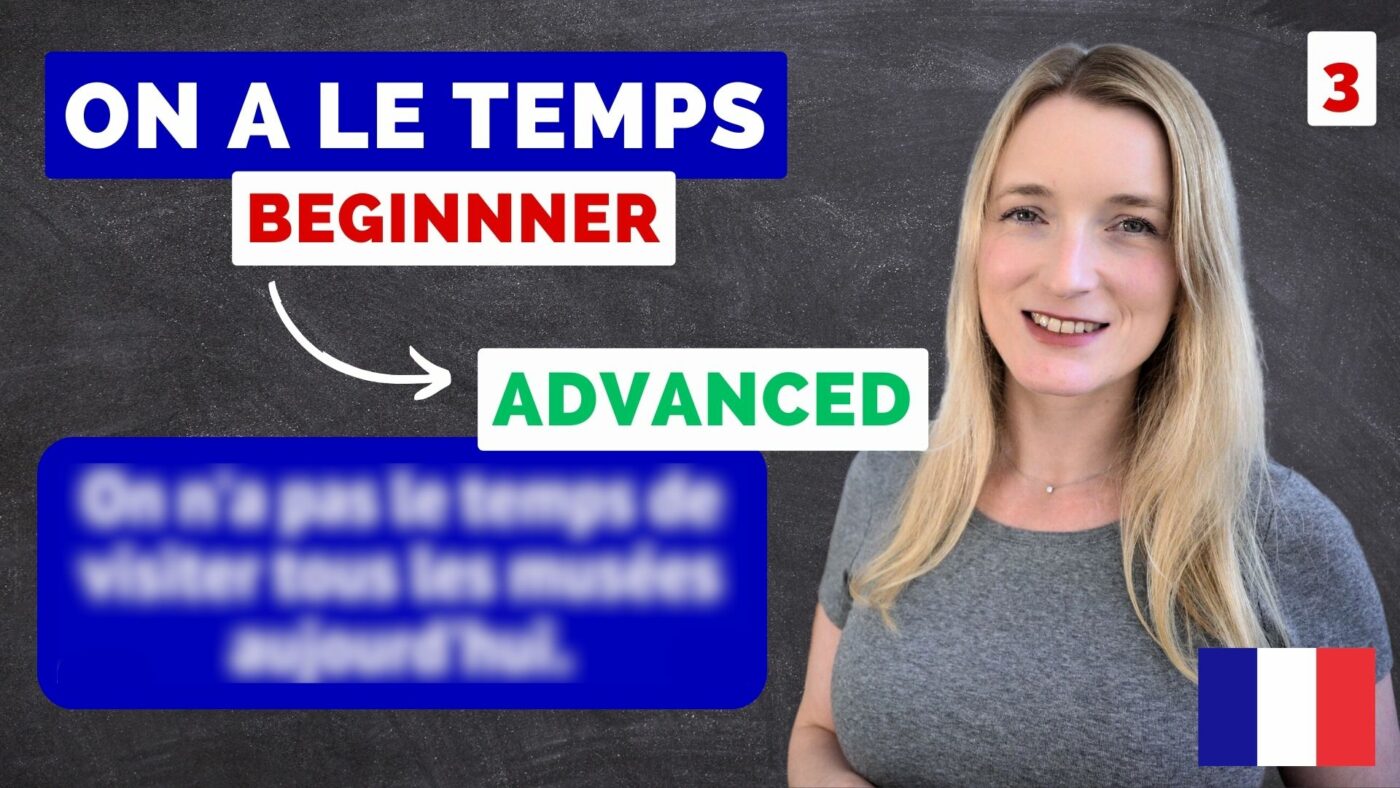Menu
Close
In today’s French lesson – French Complicated Sentence 3, we build a complicated French sentence together. We start from level A1 with a basic sentence, “On a le temps – We have time,” and we slowly add elements to end up with a complicated French sentence. All the way to a B2 level! Many of you requested to see more French tenses in this lesson, so we also change the final sentence to 9 different tenses. This lesson includes some French grammar, French conjugation, as well as French vocabulary!
This French lesson is divided into 2 different steps:
Step 1: Build a complicated French sentence.
Step 2: Change the sentence to 9 different French tenses.
– Passé composé
– Imparfait
– Futur simple
– Futur proche
– Impératif
– Conditionnel présent + imparfait
– Conditionnel passé + plus-que-parfait
– Subjonctif présent
– Subjonctif passé

Don’t forget your free PDF to keep and review.
Basic sentence
On a le temps.
We have time.
Subject pronoun + verb + article + noun
Add a preposition and an infinitive verb
On a le temps de + infinitive verb
We have time to + infinitive verb
Subject pronoun + verb + article + noun + preposition + infinitive verb
In French, we wouldn’t end the sentence with “visiter”, we need to add a direct object
On a le temps de visiter quelque chose.
We have time to visit something.
Subject pronoun + verb + article + noun+ preposition + infinitive verb + pronoun (object)
Describe the direct object
On a le temps de visiter les musées.
We have time to visit the museums.
Subject pronoun + verb + article + noun+ preposition + infinitive verb + article + noun
Add an adjective to describe how many museums
On a le temps de visiter tous les musées.
We have time to visit all the museums.
Subject pronoun + verb + article + noun+ preposition + infinitive verb + adjective + article + noun
Add a reference of time
On a le temps de visiter tous les musées aujourd’hui.
We have time to visit all the museums today.
Subject pronoun + verb + article + noun+ preposition + infinitive verb + adjective + article + noun + adverb
Add a negation (around the verb)
On n’a pas le temps de visiter tous les musées aujourd’hui.
We don’t have time to visit all the museums today.
Subject pronoun + negation + verb + article + noun+ preposition + infinitive verb + adjective + article + noun + adverb
Passé composé
The use of passé composé implies that the day is done and you had time to visit all the museums.
On a eu le temps de visiter tous les musées aujourd’hui.
We had time to visit all the museums today.
On n’a pas eu le temps de visiter tous les musées aujourd’hui.
We didn’t have time to visit all the museums today.
Imparfait
The use of imparfait implies that this is something that happened regularly in the past. I also removed the reference of time.
On avait le temps de visiter tous les musées.
We had time to visit all the museums.
On n’avait pas le temps de visiter tous les musées.
We didn’t have time to visit all the museums.
Futur simple
The use of futur simple implies that this will happen in the future (demain).
On aura le temps de visiter tous les musées demain.
We will have time to visit all the museums tomorrow.
On n’aura pas le temps de visiter tous les musées demain.
We won’t have time to visit all the museums tomorrow.
Futur proche
The use of futur proche implies that this will happen in the near future, in this case, later today.
On va avoir le temps de visiter tous les musées aujourd’hui.
We will have time to visit all the museums today.
On ne va pas avoir le temps de visiter tous les musées aujourd’hui.
We won’t have time to visit all the museums today.
Impératif
The use of impératif implies that this is not something that the person is willing to discuss (order).
Visitons tous les musées aujourd’hui.
Let’s visit all the museums today.
Ne visitions pas tous les musées aujourd’hui.
Let’s not visit all the museums today.
Conditionnel présent + Imparfait
The use of conditionnel présent and imparfait implies something that we could do “if.” In this case, I added a condition. This statement is happening at the same time as the trip.
On aurait le temps de visiter tous les musées si nous restions quelques jours de plus.
We would have time to visit all the museums if we stayed a few more days.
Conditionnel passé + plus-que-parfait
The use of conditionnel passé and plus-que-parfait implies something that we could have done “if.” In this case, I added a condition. This statement is being said after the trip.
On aurait eu le temps de visiter tous les musées si nous nous étions levés plus tôt.
We would have had time to visit all the museums if we had gotten up earlier.
Subjonctif
The use of subjonctif comes atfer c’est bien que/c’est dommage que. It is said on the same day of the visit at the museums.
C’est bien qu’on ait le temps de visiter tous les musées aujourd’hui.
It’s good that we have time to visit all the museums today.
C’est dommage qu’on n’ait pas le temps de visiter tous les musées aujourd’hui.
It’s a shame we don’t have time to visit all the museums today.
Subjonctif passé
The use of subjonctif passé comes atfer c’est bien que/c’est dommage que. It is said at the end of the day.
C’est bien qu’on ait eu le temps de visiter tous les musées aujourd’hui.
It’s good that we had time to visit all the museums today.
C’est dommage qu’on n’ait pas eu le temps de visiter tous les musées aujourd’hui.
It’s a shame we didn’t have time to visit all the museums today.
If you prefer to watch a video lesson, you can watch this video.

4 Responses
Such a beautiful class
This is a great lesson. You have helped me understand the French language mieux. Merci!
De rien Lawrence 🙂
Merci ! Un autre leçon excellente.